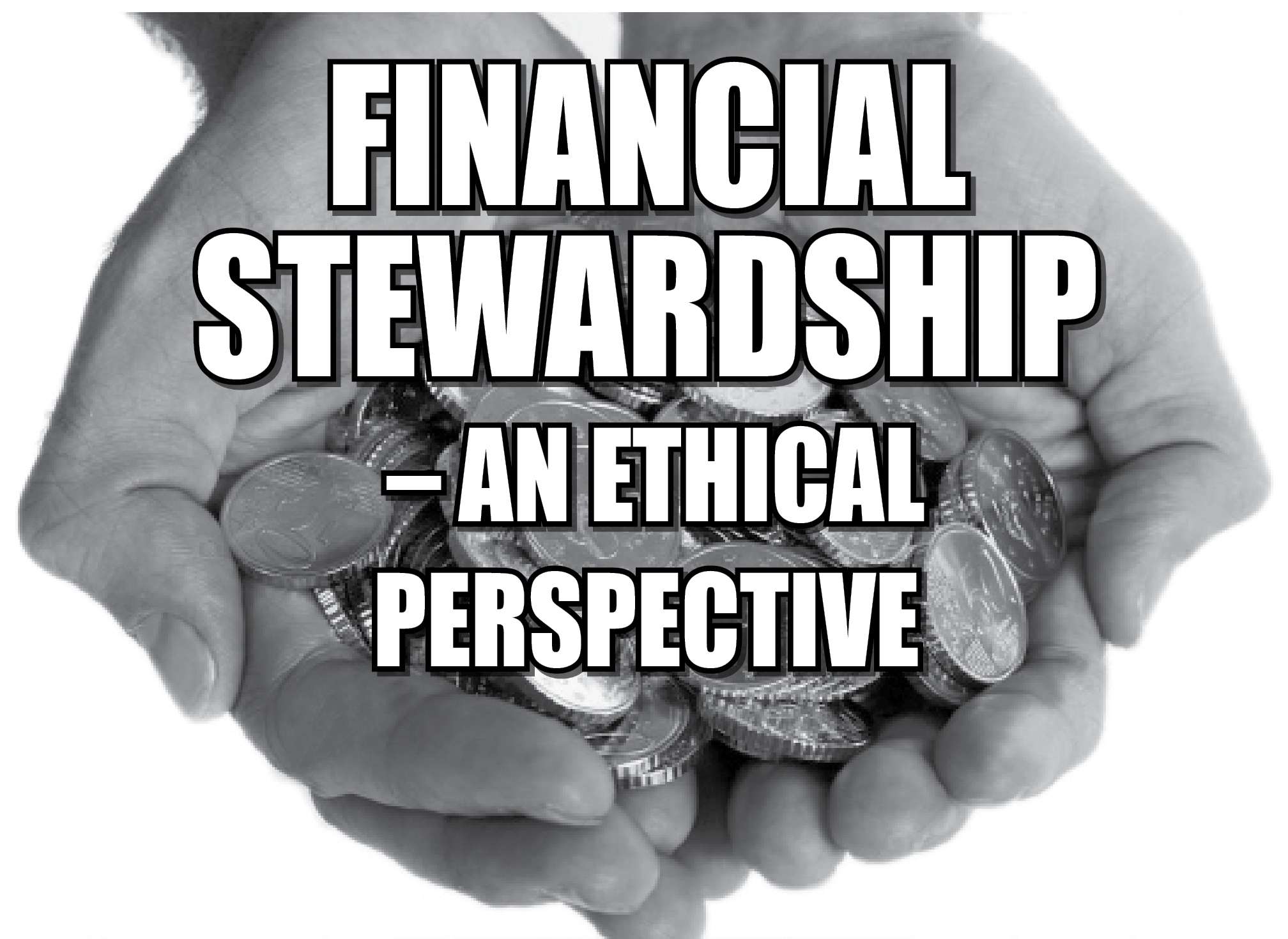

Financial Stewardship-an Ethical Perspective
Pr. Christopher Varughese
The Bible speaks volumes on money and material possessions. Out of the 38 parables of Jesus, 16 are concerning money. Approximately 2,000 verses in the Bible deal with this subject. Jesus asks us not to lay up for ourselves treasures on earth; “but lay up for yourselves treasures in Heaven… For where your treasure is, there will be your heart also.” We also see a strong message where Jesus speaks of a servant not being able to serve the two masters, namely, God and mammon (materialism). Thus, we must seek to use our financial resources to invest in heavenly and eternal purposes as clearly mentioned in Matthew 6:33, “But seek ye first the kingdom of God, and his righteousness; and all these things shall be added unto you.”
Most people are satisfied by being faithful in giving to the Lord. By giving tithe or a share of their income, they believe that their duty is over. Mark Allen Powell states that, “Financial stewardship is not only a matter of faithful giving but of faithful living.” He describes four areas where we need to be ethically careful in attempting to lead a life toward biblical financial stewardship.
1. Be Ethical in how we Acquire Income
When we are faithful stewards, we acquire our money in God-pleasing ways. Assuming that we are healthy enough, Bible expects us to work for our financial needs (2 Thes 3:10-12). Furthermore, this work has to be done with honesty. The law of Moses provides details for business dealings (Lev 19:35-36; Deut 25:13-15), maintaining that "all who act dishonestly are abhorrent to the Lord" (Deut 25:16). The prophet Amos cries out against merchants who practice deceit with false balances (Amos 8:5-6; Lev 19:35). In the New Testament, John the Baptist tells soldiers not to supplement their wages by extorting money or accepting bribes (Luke 3:14), and he instructs tax-collectors to gather no more than the prescribed amount (Luke 3:13). Thus, honesty is intended to typify persons who are faithful stewards of God.
The Bible further forbids us from taking advantage of others. God says, "Do not take interest in advance or otherwise make a profit from them" (Lev 25:35-37; see also Exod 22:25-27). Amos also rails against those who gain wealth at the expense of the poor (Amos 2:6-7; 5:11). In the New Testament, Jesus castigates religious leaders who have become rich by confiscating the homes of widows (Luke 20:47). The ethical treatise by apostle James also speaks to wealthy landowners who fail to pay their field hands a decent wage (James 5:1-6).
We also need to have the right attitude regarding our work. Martin Luther encouraged every worker to view his or her job as a calling from God. In his exhortation to the slaves in Colossian 3:22f Paul writes, “Whatever you do, work at it with all your heart, as working for the Lord, not for human masters, since you know that you will receive an inheritance from the Lord as a reward.” Of course, there may be some professions that stewards of God should simply avoid; work that is intrinsically immoral or contrary to the purposes of God. When we understand that we cannot change the corrupt practices of our work place, despite repeated attempts, the best option for us is to step out. But, generally speaking, we can all be faithful stewards of God by pursuing occupations that involve us in useful and worthwhile activities.
2. Be Ethical in our Attitue Toward Money
Our attitude toward the use of money is a revealing barometer of spiritual health and maturity. Scripture says that "the love of money is the root of all kinds of evil" and maintains that one "cannot serve God and wealth." (Matt 6:24). If money is the primary source for joy or that which brings meaning in our life, then we are inclined toward loving money. Similarly, if we allow money to exercise a controlling influence over our decisions we are thereby serving money. Money, then, is to be something that we use for our needs, not something that we love or serve.
The above does not mean that we should have an immediate aversion to anything connected with money or materialistic. Bible generally encourages us to take a positive attitude toward our possessions. God is often identified as the ultimate source of prosperity (Prov 28:25) and Moses tells the Israelites to view affluence as something to celebrate (Deut 8:10). Jesus says that the Father in heaven gives "good things" to his children (Matt 7:11) and we might conclude from other stories in the Gospels that such good things include nice clothes (Luke 15:22), fatted calves (Luke 15:23), perfume (Mark 14:3-6), houses and fields (Mark 10:30) and other things associated with pleasant living in a material world.
If there is a problem with affluence in the Bible, it is not that there is anything wrong with prosperity itself but that material abundance leads to spiritual amnesia. Moses has to warn the Israelites, "Do not say to yourself, 'My power and the might of my own hand has gotten me this wealth,' but remember the Lord your God, for it is he who gives you power to get wealth" (Deut 8:17-18). Thus, stewards are encouraged to view their material possessions as gifts of God and to be thankful for them. In our modern age, notions of entitlement run rampant and have become increasingly easy to adopt. Such notions are a surefire prescription for joyless living: we find it difficult to appreciate what we have when we think that we are only getting our due, and we find it easy to complain about what we lack when we think that we are not getting our due. The good news of biblical stewardship provides an antidote to such notions. It inculcates genuine gratitude.
Acknowledgment of God as the giver of all that we have also implies trust in God's continuing benevolence. The Bible cautions us not to be anxious (Matt 6:25-33). "Do not worry about tomorrow," Jesus says (Matt 6:34). "Do not worry about anything" (Phil 4:6). When we trust in God to provide for us with what we need, we can have less stressful and more satisfying lives. It is trust in God that accounts for Paul's startling claim, "I have learned to be content with whatever I have" (Phil 4:11). Such contentment is grounded in the confidence that we not only will have enough to survive, but that we already do have enough. We have enough to be the people God wants us to be and to have the lives God wants us to have.
Thus, we should be careful from extremes of teachings that speak of poverty as true Christianity on one hand and prosperity as a sure sign of God’s blessings. God will provide for our needs and not our wants. Thank God for the beautiful house, car, clothes, and rich food He provides. Nevertheless, we are not called to seek after these things. A close reading of Matthew 6:32 would render us as gentiles if we work or live for water, food or clothing. It is God’s duty to provide for us. He does His work excellently.
3. Be Ethical in how we Manage Money
Several biblical stories and parables make clear as to how we ought to manage our money. Storing up treasures on the earth or hoarding is one such principle that Bible opposses. “Do not store up for yourselves treasures on earth, where moths and vermin destroy, and where theieves break in and steal” (Matthew 6:19).
Money is to be used wisely, not hoarded. The best example of this may be the parable of the rich fool that Jesus tells in Luke 12:15-21. This man has so many goods that his barns will not hold them. He had enough space to accomodate all his needs but it wasnt sufficient for his wants. Instead of trying to reason with himself on reducing a little bit of what he had hoarded over the years, he does just the opposite. His ultimate solution to the problem was to tear down the barns and build bigger ones. His decision results in God calling to him a fool. Bible is not against saving money for some definite purpose. However, admonition is given to store our wealth in heaven. “But store up for yourselves treasures in heaven, where moth and vermin do not destroy, and where theieves do not break in and steal” (Matthew 6:20). One such means of achieving this is is by contributing toward the cause of the Kingdom of God.
Money or wealth used unwisely also leads to another ethical misfortune. Bible denounces hoarding not in the sense of permitting to squander money. Luke 15 clearly indicates otherwise. The younger son who wasted his wealth in wild living is found to have landed himself in trouble when a famine strikes suddenly.
To avoid the problem of hoarding and squandering, we need to think through our intentions and prayerfully submit them to God, asking, "How much should I set aside for this or for that? When am I storing away too much and when am I saving too little?" Jesus told yet another parable that might be apropos to this subject. In Matthew 25:14-30, he speaks of a man who gives money to three of his servants and waits to see what they will do with what they have been given. Two of the servants are deemed "good and trustworthy" because they successfully engage in the commerce of the day and manage to double what was given them. The third servant is denounced because he simply buries the money in the ground and digs it up later, proud that nothing was lost. Like most parables, this story has a metaphorical moral with a wide range of application, but there is certainly something to be learned at a literal level about financial management: doing nothing at all is seldom the best course.
Concern for money management is mostly overlooked. The pervasiveness of high-interest credit-card debt in our modern society is evidence that mismanagement of personal finances has reached epidemic proportions. The world of the Bible knew nothing of stock markets, tax brackets, or pension plans, but the Bible does have more to say about money management than we might imagine.
Faithful stewardship must begin with a basic commitment to getting our finances under control. Faithful stewardship might mean altering our spending habits, developing a budget, or learning to invest and save our money wisely. It might mean seeking the counsel of trained financial advisors, and approaching all of our decisions about money management with prayerful consideration of what God would have us do.
4. Being Ethical in how we Spend Money
Christian stewardship generally commends the virtue of frugality, a way of moderation that encourages Christians to distinguish between luxuries and necessities and to place some limits on acquisition of the former. The apostle Paul is of the opinion that it is not a matter of concern if he is rich or poor, having plenty or little. He knows that he will be content and that he will be a faithful steward of Jesus Christ regardless (Phil 4:12). Paul does not assume that either poverty or riches would be his undoing because he knows that God is at work in him (Phil 1:6) and that he can do all things through Christ (Phil 4:13).
Accordingly, Christians may view the commendation of frugality and moderation not as a requirement but as an invitation to a joy-filled life. We all know that acquisition of possessions does not in itself bring joy. What is called for, then, is not an arbitrary distinction between "necessities" and "luxuries" but discernment regarding what is truly worthwhile and what is not. Ultimately, such decisions must be matters for personal conscience or family discussion. Christian stewards may not always be consistent or predictable in such deliberations, but the mere fact that they consider such matters prayerfully, seeking the guidance of God's Spirit, will set them apart from the general population.
If we begin consciously spending our money in ways that we believe are pleasing to God, we will not miss out on the pleasures of life. If anything, we will begin appreciating such pleasures all the more, knowing that God approves and applauds our enjoyment of this good world and much that it affords. Discerning people lack no appreciation for the wonder and value of life but, to the contrary, appreciate what they have and do not regret the absence of what they choose to forego.
We need make no apologies for showing such discernment. John Westerhoff points out, for instance, that parents often deflect the more extravagant desires of their children by saying, "We can't afford that." The implicit message is that the parents would buy the costly item if they had the money, which may or may not be true. In any case, the children are left feeling sad and, worse, believing that such sadness could be remedied if only the family had more money. Instead, he suggests that we say, "We don't think that getting this would be a good use of our money" or even, "We don't believe that God would want us to use our money in this way"? Of course, such a response might invite arguments from the children regarding why the purchase would be a good use of the family's money or why God would favor the purchase, but such discussions involve the entire family in thinking about the use of money in broader terms.
When we are faithful stewards, we spend our money in God-pleasing ways. We please God when we use our money in ways that serve others (1 Pet 4:10-11) and that demonstrate appropriate self-care. May the Lord help us to live in content with the resources that we have and use our resources wisely.





